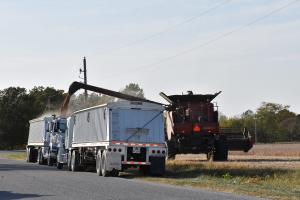From dump truck driver to teenager, everyone should be aware of potential electrical hazards
Review overhead power line locations and height clearance with anyone and everyone working on the farm or doing business there.”
SPRINGFIELD, ILLINOIS, UNITED STATES, September 7, 2021 /EINPresswire.com/ -- Harvest means long hours, increased stress and tight schedules. Because of that, Safe Electricity reminds farmers that it only takes a split second for someone to come into contact with electricity. Your most seasoned worker to your least, your spouse, your son or daughter or other family member, an ag-related worker dropping off a load or applying fertilizer ? any person on your farm is at risk of becoming injured or killed due to electrical contact.— Erin Hollinshead
?Review overhead power line locations and height clearance with anyone and everyone working on the farm or doing business there,? says Erin Hollinshead, executive director of Safe Electricity. ?Although harvest is filled with tight deadlines and heightened work stress, making time for safety, including electrical safety, can save lives.?
To help keep those who work or do business on your farm safe not only during harvest, but year-round, follow these electrical safety tips:
? Educate everyone that potential electrical hazards include both direct and indirect contact with an overhead power line or pole. Indirect contact (coming too close to a power line or pole), could cause electricity to arc/jump.
? Both direct and indirect contact can change electricity?s path to ground. Once that path changes, the stray voltage can energize anything in its path, such as a truck, a tractor, an extension, the ground, or a person.
? Start every workday with a safety meeting. Discuss all operations for the day and go over power line/pole locations. Emphasize safety above speed to everyone on the farm, especially during busy seasons like harvest.
? Never assume that because someone grew up on the farm that they understand the potential of stray voltage or other electrical hazards. In fact, do not assume this for anyone. For example, teens who have moved irrigation pipes to free an animal have been seriously hurt or electrocuted.
? Encourage drivers and operators to position grain augers in their lowest position or to lower truck bed boxes before moving. Be especially cautious of overhead lines when using augers in the field to load trucks on the road.
? Review potential hazards with grain/dump truck drivers and spot them when possible. Also:
1. Encourage drivers to load and unload all materials away from overhead power lines when possible.
2. Even better, create a dedicated drop zone away from all overhead power lines.
3. Post 10-foot clearance rule and ?look up and look out? reminders.
? If you see that a hydraulic truck bed, extensions or other equipment gets within 10 feet of or contacts a power line, utility pole or guy wire, instruct the driver to stay in the cab. Call 9-1-1 to have your electric cooperative or utility dispatched to deenergize the power. Give instructions from 50 feet away and inform everyone else to stay back.
? Know how to instruct someone to properly exit a cab if necessary due to fire (do so from at least 50 feet away). The person should cross their arms close to their chest and make a solid jump out of the cab. Then, the person should make deliberate hops, with feet together, hopping away as far as they can. When people walk or run in an area with stray voltage, they could be exposed to two different voltages at the same time and become electricity?s path to ground. This is known as step potential.
? Encourage folding and unfolding to be done well into the field, not at the field?s edge, which could have power lines running next to it.
? Do not store irrigation pipes, hay bales, machinery or anything else under power lines.
? Be aware of power line locations in the proximity of grain bins. Always load and unload on the side without a power line. Contact your electric cooperative or utility with questions about grain bin power line clearance/OSHA regulations.
Contact your electric cooperative or utility about damaged or downed power lines or poles. Utility crews would much rather check out an issue than risk a potentially dangerous situation.
Learn more at SafeElectricity.org.
Safe Electricity is the award-winning, public awareness program of the Energy Education Council, a 501(c) 3 established in 1952 on the campus of the University of Illinois at Urbana-Champaign. With offices located in Springfield, Ill., Safe Electricity operates under the University of Illinois Extension and is led by the Safe Electricity/EEC Board of Directors. Since the Safe Electricity program was created in 2001, it has provided thousands of safety-minded resources to its more than 500 utility members from across the country to help save lives and reduce injuries.
Ann Augspurger
Safe Electricity
+1 217-546-6815
email us here




